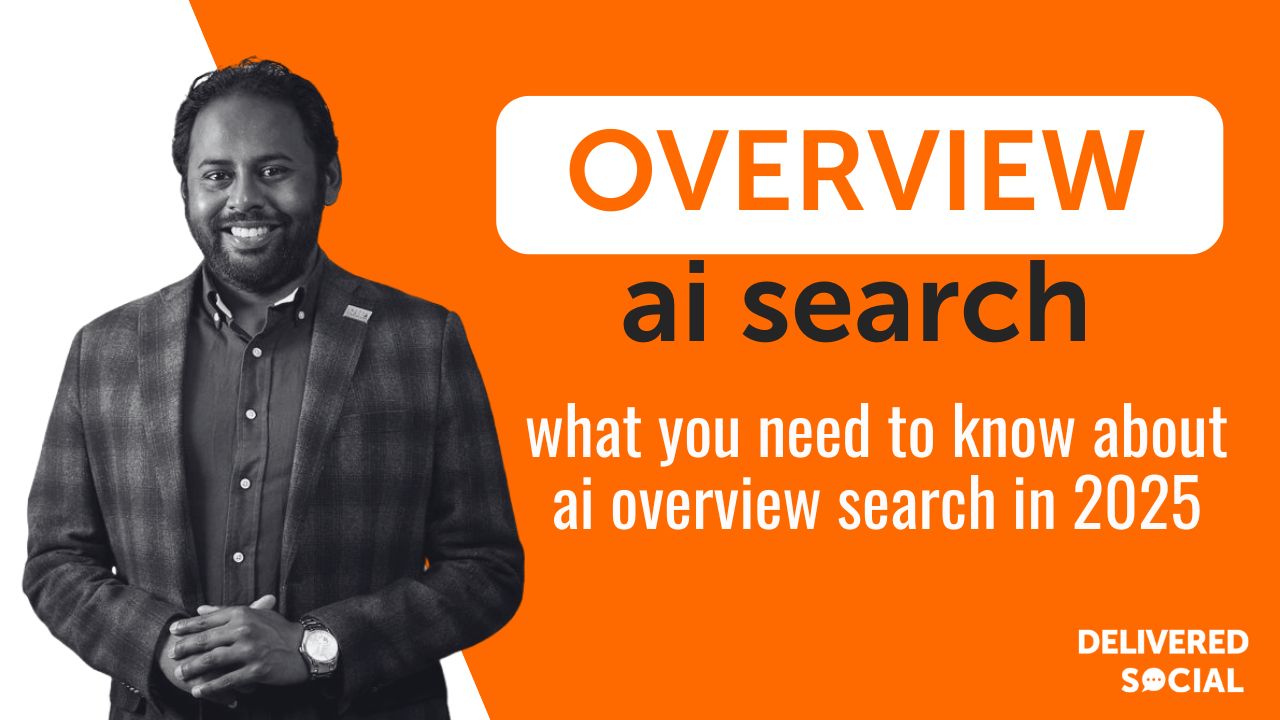
At Delivered Social, We as much as anyone in digital marketing know AI is reshaping how we search for information online. From the moment we type a query into Google to the results we receive, artificial intelligence is playing an increasingly significant role in delivering smarter, more accurate answers. One of the most exciting developments in recent years has been AI Overview Search, where AI is not only used to rank pages but also to understand the context behind every search.
In 2025, search engines are smarter than ever, thanks to advancements in AI technologies like natural language processing and machine learning. But what does this mean for businesses, digital marketers, and content creators? How can we ensure that our content continues to perform well when search engines are getting so much better at understanding user intent?
In this article, we will explore AI Search Overview, what it is, how it impacts SEO, and how businesses can adapt their strategies for the new era of search. We will also look at how Google’s AI advancements have changed search results and how marketers can prepare for even more AI-driven shifts in the near future.

What is AI Overview Search?
AI Overview refers to the growing influence of artificial intelligence in how search engines, particularly Google, interpret and respond to user queries. As AI becomes more integrated into search technology, it changes how search engines process data and provide results, improving the overall user experience.
The main goal of AI Overview is to enhance the accuracy of search results. Machine learning algorithms are used to better understand the context and intent behind searches. This means that instead of simply matching keywords, search engines can now analyse the meaning behind a query. This leads to more relevant and useful results for users.
AI Overview Search also relies on advanced AI technologies like natural language processing (NLP) and deep learning. These systems help search engines interpret more complex, nuanced queries. For example, if a user asks a question or searches in a conversational tone, AI can understand the intent behind those words in a way that traditional search algorithms could not.
One of the most powerful aspects of AI Overview is its ability to learn. The system continually gathers data from past searches, adjusting its responses to better predict what users need. As a result, searches are faster, more precise, and more personalised. This is a major step forward for search engines as they aim to provide users with the most accurate answers in the shortest amount of time.
Google’s Use of AI in Search
Google has long been a leader in integrating artificial intelligence into its search technology. From the early days of search algorithms to the sophisticated AI systems in place today, Google has consistently pushed the boundaries of what AI can achieve in providing the most relevant search results.
A major milestone in this journey was the introduction of BERT (Bidirectional Encoder Representations from Transformers). BERT brought significant improvements to how Google understands conversational search. This AI model allows Google to process words in context, rather than simply matching keywords. For example, BERT can now understand the full meaning of a sentence, rather than just isolated terms, helping to deliver more accurate results for complex queries.
Following BERT, Google introduced another groundbreaking model, MUM (Multitask Unified Model). MUM is designed to process information across multiple languages and modalities, meaning it can understand not just text but also images, videos, and audio. With this technology, Google is able to deliver more comprehensive search results, answering questions with a wider variety of sources and media types.
But AI is not just about ranking pages; it’s about understanding context. Google’s AI systems can now assess the meaning behind long-tail keywords or intricate search queries. This means that, rather than relying on a simple keyword match, Google’s AI can interpret what users are truly asking for, offering more relevant results based on that deeper understanding.
Moreover, Google’s AI goes beyond just the text of a search query. It takes into account various factors such as the user’s intent, their search history, and even their location. It can also analyse the tone of a query. This allows Google to personalise search results and deliver responses that are not just relevant in general but tailored to the individual user’s needs and context.

Why AI Overview Search Matters for SEO in 2025
As AI continues to evolve, AI Overview is becoming a game-changer for SEO. The way search engines rank content is no longer solely based on keyword matching. Google’s AI-powered systems are now focused on understanding the intent behind a search query, making SEO optimisation more important than ever.
In 2025, traditional SEO practices that rely heavily on keyword placement are no longer enough. With AI’s increased ability to understand context, relevance is now at the core of any successful SEO strategy. Search engines can better interpret complex queries and deliver results that make sense for the user, regardless of whether the exact keyword is used or not.
Content optimisation needs to go beyond just including targeted keywords. In the AI-driven world of search, it’s essential that content focuses on understanding and addressing the user’s intent. This means that answers must be clear, comprehensive, and directly relevant to what the user is searching for, not just loaded with keywords in a bid to rank.
For SEO strategies in 2025, businesses must be prepared to adapt to AI’s ability to sift through vast amounts of data and determine what makes content authoritative. Content creators must ensure that their articles, blogs, or web pages provide comprehensive, high-quality information. This not only improves user satisfaction but also ensures better ranking by AI-powered search engines that reward useful and informative content.
Optimising for AI Overview Search
To effectively optimise for AI Overview, it’s essential to focus on producing high-quality, in-depth content that directly addresses user intent. Gone are the days when stuffing content with keywords was enough to rank. Today, search engines, powered by AI, are more focused on understanding and fulfilling user needs. Content should answer specific questions comprehensively, providing the information that users are genuinely looking for.
One of the key elements of AI-based search is semantic search. This refers to the use of related terms and phrases that AI may associate with your primary keyword. For instance, if your main keyword is “AI Overview Search,” you should include variations and related concepts, such as “artificial intelligence in search,” “Google AI algorithms,” or “search engine machine learning.” By doing this, you help AI understand the broader context of your content, improving its chances of ranking higher in relevant searches.
Another important factor is content structure. To meet the needs of both AI and human users, it’s critical to present your information in a clear, easy-to-read format. Use clear headings (H2s, H3s), bullet points, and concise paragraphs. This makes the content more digestible and easier for search engines to parse, improving your chances of ranking. Clear structure also helps users quickly find the information they need, which leads to better engagement and lower bounce rates.
Lastly, SEO strategies must remain adaptive. Google’s AI technology is always evolving, and so are the search algorithms. To stay ahead, it’s important to keep up with the latest updates from Google and adjust your strategies accordingly. Regularly check for changes in AI technologies and search algorithms. Understanding these shifts will allow you to fine-tune your SEO approach and maintain a competitive edge.
The Future of AI in Search
As AI technology continues to advance, the future of search engines looks incredibly exciting. In the coming years, search engines will become even more intuitive, understanding not only what users are searching for but also their preferences and behaviours. With the ability to analyse vast amounts of data, AI will personalise search results to an unprecedented degree, tailoring them to individual users in real-time. This shift will make search engines even more accurate and relevant, offering results that feel highly customised to each user’s needs.
In addition to personalisation, AI-driven search will continue to prioritise the user experience. Search engines are evolving to focus less on rigid algorithms and more on understanding the context of searches. This will allow them to deliver predictive results that anticipate what users are looking for, based on a combination of historical data, context, and user intent. As a result, the search experience will become much more fluid, dynamic, and aligned with the way people think and search.
One of the most significant changes we can expect is the increased prominence of voice search and conversational queries. With the growing use of voice assistants like Google Assistant, Siri, and Alexa, users are asking more natural, spoken questions. Optimising for these voice search queries will become critical for businesses, as users shift away from traditional typed searches. Content will need to be structured in a way that mirrors conversational language, with a focus on long-tail keywords and natural phrasing.
The evolution of AI in search will also introduce even more advanced features, such as visual search. Platforms like Google Lens already offer the ability to search using images, and this will likely become more common in the future. As AI technology advances, we may see even more seamless integration of visual search, allowing users to find what they need by simply taking a photo.
Finally, AI will be integrated into more platforms beyond just Google Search. From social media to e-commerce sites, businesses will need to optimise their content for AI-driven search experiences across various platforms. AI’s growing presence will reshape how we interact with the internet, making search an even more central part of the digital ecosystem.

What’s Next?
AI Overview Search is fundamentally reshaping how we engage with search engines. In 2025, businesses must embrace these changes to remain competitive. Optimising content for smarter, more intuitive search results is no longer optional—it is a necessity. With AI becoming more integrated into search engines, understanding how it works and how it influences rankings is crucial for staying ahead.
By understanding the evolving role of AI in search, businesses can adapt their SEO strategies to future-proof their online presence. The key to success will be focusing on context, relevance, and user intent rather than just keywords. As AI continues to improve, staying agile and adjusting strategies in response to AI-driven changes will be the key to ensuring that your content remains visible and effective in an increasingly AI-dominated world.
Interested In Working Together?
Introducing Delivered Social. We’re The Most-Rated Digital Agency In Surrey & Hampshire – We’ve Got To Be Doing Something Right.
Delivered Social is a digital marketing agency with one mission—to help businesses grow. We’re famous in Guildford and Portsmouth for our social clinics. We believe in free advice. We build lasting relationships because our team prides itself on being helpful, which our clients appreciate.
If you are looking for a new website or an agency to manage your social media presence, we can help.
If you need something slightly different, here's a super handy list of all our services, or you can always email us.


















